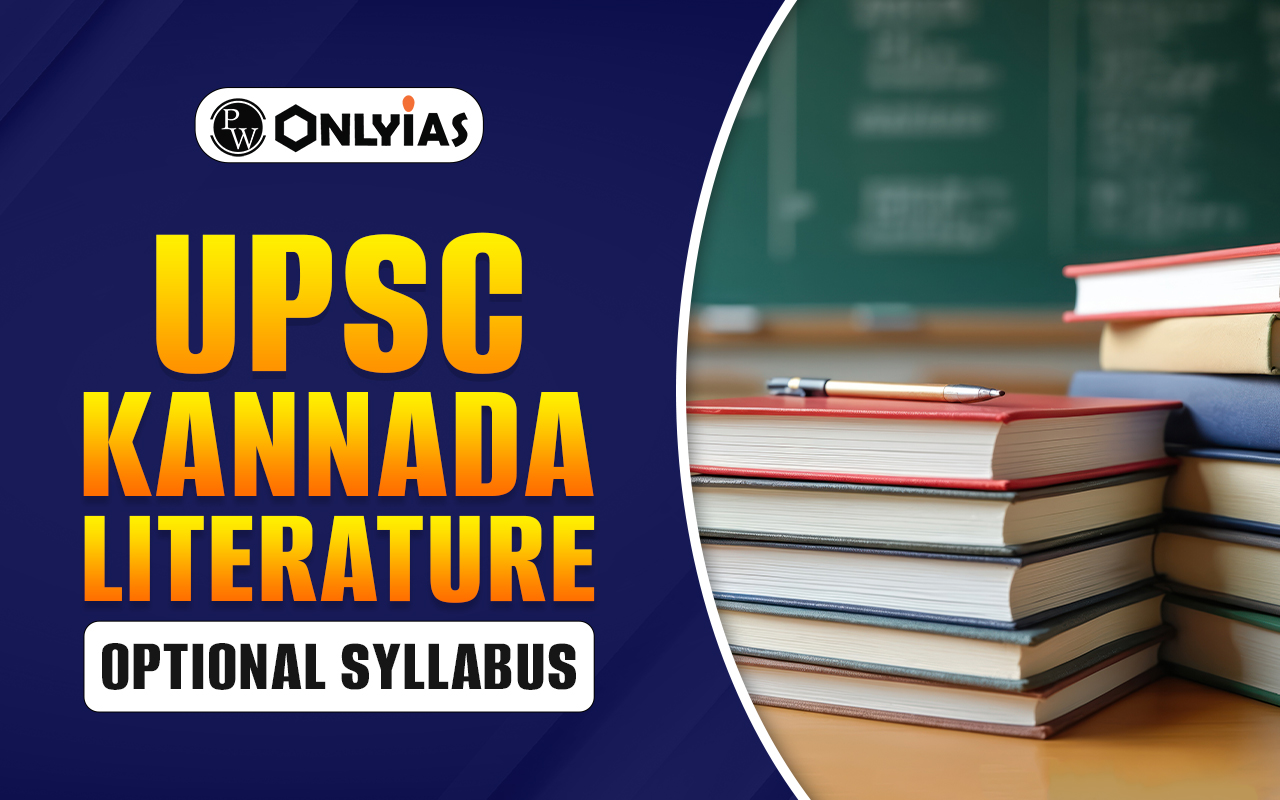Kannada Literature Optional is one of the 23 literature subjects offered by UPSC for the Civil Services Mains Examination. The 2026 syllabus covers classical, medieval, and modern Kannada literature, including poetry, prose, drama, folk literature, and literary criticism.

Kannada literature is one of the 23 literature subjects offered by UPSC as an optional for mains examination. Kannada literature involves a wide list of books that need to be referred for acing the exam. Let us check out the syllabus structure and books to be studied to successfully clear the UPSC exam.
Kannada literature for UPSC is usually selected by students belonging to the state of Karnataka or those who have studied the language previously. The subject involves deep understanding of the literature books as well as basic knowledge of Kannada language. Students who are well versed with the language are advised to take the subject as it requires exhaustive practice for scoring good marks.
As part of the subject, students will have to read History of Kannada Literature, poetic metaphysics, cultural history of Kannada language, poets such as Pampa, Ranna, Kumaravyasa, Basavanna etc.
Similar to other subjects of UPSC optional, the subject is made up of two papers, Paper 1 and Paper 2, each carrying 250 marks and divided into two sections. Each paper has a total of eight questions, divided equally into four questions. A candidate has to attempt any five questions. Question 1 and Question 5 are compulsory. Out of the remaining six, any three have to be attempted, with at least one from each section. Answers must be written in Kannada language only.
A detailed knowledge of UPSC Kannada literature syllabus is necessary to prepare well for the subject. Following is a detailed list of the syllabus for Kannada literature:
| Section A | |
| A. History of Kannada Language |
|
| B. History of Kannada Literature |
|
| C. Modern Kannada literature | Influence, trends and ideologies, Navodaya, Pragatishila, Navya, Dalita and Bandaya. |
| Section B | |
| A. Poetics and Literary Criticism |
|
| B. Cultural History of Karnataka |
|
| Section A | |
| A. Old Kannada Literature |
|
| B. Medieval Kannada Literature |
|
| Section B | |
| A. Modern Kannada Literature |
|
| B. Folk Literature |
|
UPSC Kannada Literature Optional Syllabus 2026 PDF provides detailed guidance for candidates choosing Kannada as their optional subject in the Civil Services Exam. Covering both Paper I and Paper II, it includes classical, medieval, and modern literature, literary criticism, and cultural studies. Candidates can download the PDF to understand the syllabus, exam pattern, and key topics for effective preparation.
The first step in preparation is to select all the necessary books for preparation. The following table contains the list of books for Kannada literature optional.
| Paper 1 | Paper 2 |
|
|
Candidates preparing for UPSC Kannada literature need to analyse previous year questions to get a better idea of the demand of the exam. For that purpose, analysis of PYQs is the key. The PYQs can be divided from the table below:
| Year | Question Paper |
| 2025 Kannada Literature Optional | Paper 1: Kannada Literature |
| Paper 2: Kannada Literature | |
| 2024 Kannada Literature Optional | Paper 1: Kannada Literature |
| Paper 2: Kannada Literature | |
| 2023 Kannada Literature Optional | Paper 1: Kannada Literature |
| Paper 2: Kannada Literature | |
| 2022 Kannada Literature Optional | Paper 1: Kannada Literature |
| Paper 2: Kannada Literature | |
| 2021 Kannada Literature Optional | Paper 1: Kannada Literature |
| Paper 2: Kannada Literature | |
| 2020 Kannada Literature Optional | Paper 1: Kannada Literature |
| Paper 2: Kannada Literature | |
| 2019 Kannada Literature Optional | Paper 1: Kannada Literature |
| Paper 2: Kannada Literature |
Acing Kannada literature for UPSC requires meticulous planning and execution. It involves guidance from multiple sources to maximise the score in the exam. Candidates preparing for Kannada literature optional can boost their preparation by following the below steps:
Preparation for any optional subject is incomplete without proper planning. Candidates choosing Kannada Literature as optional must have a proper plan to tackle general studies and Optional separately. This is because literature optional requires writing practice in the language script.
In addition, candidates can refer to copies of previous toppers as well as watch strategy videos from successful candidates to develop their own method for tackling the challenges.
| Must Read | |
| NCERT Notes For UPSC | UPSC Daily Current Affairs |
| UPSC Blogs | UPSC Daily Editorials |
| Daily Current Affairs Quiz | Daily Main Answer Writing |
| UPSC Mains Previous Year Papers | UPSC Test Series |
Check Out UPSC CSE Books
Visit PW Store
Yes. Toppers’ copy will provide candidates the idea about the type of answers that is required to be written for scoring good marks.
Candidates reading toppers’ answer sheets will have to first read the question, understand the demand of the question and the way it has been addressed in the answer.
Yes. Candidates need to get used to the script of the literature subject. For that to happen, they will have to write answers daily.
Candidates need to complete the UPSC Kannada literature optional within 3-4 months for them to have a good shot at clearing mains exam.
Yes. Candidates who have successfully cleared UPSC have managed to score good marks in Kannada literature optional.
Nandini KR got first rank in CSE 2016 with Kannada Literature as the optional subject. She scored 331 marks out of 500 in the optional subject, one of the highest marks in Kannada Literature.
<div class="new-fform">
</div>